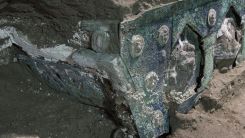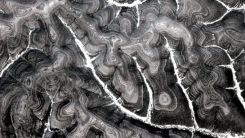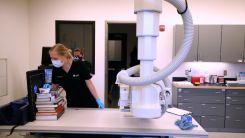
Mark Bustos

LOOK: Alligator Popsicles in Oklahoma As Reptiles Stick Snouts Out of the Frozen Water

Striped Pattern Over Russian Arctic Baffles NASA, What Is This Weird Topographical Feature?

Unpredictable Work Schedules Negatively Affect Employee Performance, Restaurant Revenues

Humans Adapt to Fight Pandemics, Bodies and Pathogens Co-Evolve Leaving Skeletal Marks

Random Number Generator Uses Ultrafast Lasers Hundreds of Times Faster Than Today's Tech

Thermoelectric Materials Made Using Novel Synthesis Strategy
Apollo Rock Samples Analysis Reveals Insights On Early Moon History

Virtual Telepresence Robot With VR Display for Real-Time Monitoring of Remote Locations
Researchers Push Game Theory in Understanding Mimicry in Viruses Like COVID
Mars Moons Phobos and Deimos Origin: Are These Remnants of a Lost Moon?
New Polymer Flexible Film Shields from Electromagnetic Radiation and Interference
Oklahoma Puppy With Six Legs and Two Tails Suffer a Combination of Congenital Disorder
Researchers Fabricate Material That Has Both Quantum Hall Effect and Superconductivity
Bioengineered Hybrid Fibers Could Assist in Skeletal Muscle Regeneration
Mental Health Problems Early in Life Can Lead to Poor Physical Health Later On
Capuchin Monkey Genome Study Unveils Clues to Long Life, Large Brains Thru Faeces DNA Extraction
Brain-Swelling Nipah Virus The Next Pandemic? Scientists Warn Its 75 Times Deadlier Than COVID-19
Bacteria-Synthesized Magnetic Nanoparticles Could Soon Find Biomedical Applications

New Study Takes Us Closer to Holograms on Food

Researchers Fabricate Novel X-Ray Photodetectors by Embedding Perovskites on Graphene
Italy's Mount Etna Spews Ash and Smoke in New Eruption

NATO Multimedia's Science Series Looks at High-Altitude Balloons
Vibrating 2-D Materials Could Revolutionize Electronics
Terrains on Mars Might Be Far Older Than Previously Thought
Living Near Artificial Night Lights Increases Risks of Thyroid Cancer
The SpaceX Crew Dragon Spaceship Sets a New Record for Most Days in Space
23-Year Data Reveals How High-Latitude Lakes Respond To Climate Change

New Optical Coatings Reflect and Transmit Colors of Impressive Purity
Researchers Report a Mysterious Organic Material That Catalyzes and Reduces Chemical Waste
Most Popular

CRISPR Gene Editing Revolution: How Biotechnology Advances Are Rewriting Human DNA

What Ancient Egypt's Pharaohs Really Hid Inside the Pyramids—and Why Most Disappeared Fast

Snow Moon Will Swallow a Bright Star This Weekend in a Rare Naked-Eye Sky Event

Tesla Battery Chemistry: How Lithium-Ion EV Batteries Achieve Extraordinary Electric Car Battery Life




